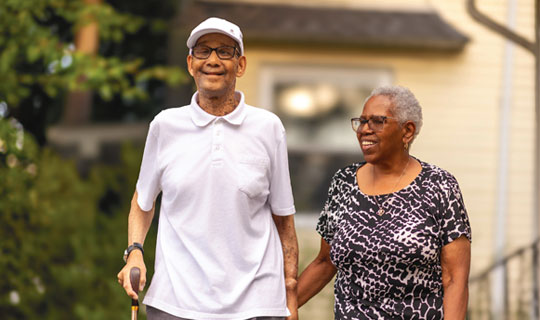“Our providers at RWJBarnabas Health have been a lifesaver for us in so many ways,” says Doris. “We just cannot say enough good things about them.”

A man’s surgery caps a history of specialized services received close to home.
If hospitals had the equivalent of frequent flyer programs, John Jones, 70, of Orange, might have platinum status at Cooperman Barnabas Medical Center.
John had a kidney transplant at the hospital in 2012. He’s also received treatment for prostate cancer, had a lung biopsy and undergone hernia surgery. John has always felt confident in the doctors and other providers entrusted with his care at the hospital. As a result, he knew where to turn when his most recent serious medical issue emerged: He needed surgery to repair an aortic aneurysm and have his aortic valve replaced.
His complex medical history illustrates the value of having local care available at a tertiary medical center—a term referring to the level of services available. Tertiary care centers offer specialized, hospital based care such as transplants, dialysis and heart surgery. “I call him the bionic man,” says John’s wife, Doris. “Having access not only to a variety of services but also to a variety of specialists is one of the unique benefits of a tertiary care center like ours,” says cardiothoracic surgeon Ioannis Loumiotis, MD, who performed John’s cardiovascular procedure on June 10.

Confronting Serious Conditions
John’s multilayered health history began with high blood pressure, which eventually led to kidney damage and the need for dialysis to filter his blood.
He was on the transplant wait list for eight years, during which he had dialysis three times a week while working long hours at a factory in Fairfield.
“I would get up at 4 o’clock in the morning to be at work at 5,” John says. “I worked 5 a.m. to 3:30 p.m. every day, and had dialysis at 6 p.m.”
His transplant operation gave John a new life. “After I got the kidney, I felt like a brand-new person,” he says. “And the transplant team was excellent. They still follow me.” He’s especially enjoyed life since retiring in 2019, doing work around the house and occasionally going deep-sea fishing. But over the years, John developed stenosis in the valve of his aorta, the large artery that delivers blood from the heart to the rest of the body. Stenosis occurs when the aortic valve becomes stiff and narrow. The condition requires the heart to work harder to deliver blood and can trigger symptoms such as shortness of breath, chest pain and fatigue. Left untreated, severe aortic stenosis can lead to potentially life threatening heart failure.
At first, doctors thought John might be a candidate for transcatheter aortic valve replacement (TAVR), a minimally invasive procedure that replaces the diseased valve using a catheter (tube) that’s threaded to the heart through a blood vessel.
But a CT (computed tomography) scan in January 2024 revealed that John also had an aortic aneurysm—another serious cardiovascular condition in which a balloon-like bulge forms in the aorta, posing the risk of a dangerous rupture. After consulting Dr. Loumiotis, John and Doris decided that the best approach was an open heart surgery that would both replace John’s aortic valve and repair the aneurysm. “That was a little scary,” says Doris. “I had concerns about him being on the bypass machine and going under anesthesia. But we had confidence that it was going to be all right.”
A Team Effort
Dr. Loumiotis recognized other challenges. As a transplant recipient, John was on a variety of immunosuppressant medications that kept his body from rejecting his transplanted kidney. Though vital, the medications can present potential difficulties during surgical procedures.
“Immunosuppressants have a range of side effects,” says Dr. Loumiotis. “Most importantly, they can affect the healing process. They inhibit the immune system, which can increase the risk of infections. We have to be very alert to that.”
John’s transplant doctors also evaluated him before the operation to make sure his kidney function was strong.
On the day of the surgery, Doris sat with her sister in the waiting room for about seven hours. “ We were so glad when it was finally over and the doctor came out and told us John did great,” Doris says. “We’ve had nothing but excellence at Cooperman Barnabas Medical Center.”
John spent several days in the hospital to heal with help from his surgeon, specialized nurses, transplant doctors, physical therapists and other providers.
“Caring for patients is a team effort,” Dr. Loumiotis says. “It starts before I even see the patient, when our outstanding nurse practitioners collect information and make sure that we don’t miss any important details on the preoperative evaluation. It continues beyond surgery, when we see the patient in the clinic to make sure the outcome is good and the patient is feeling well.”
John made a strong and steady recovery. “When I saw him in the clinic recently, his energy was back to normal,” Dr. Loumiotis says.
“Our providers at RWJBarnabas Health have been a lifesaver for us in so many ways,” says Doris. “We just cannot say enough good things about them.”
No one plans on heart disease, but everyone should have a plan for it. Connect with an RWJBarnabas Health heart and vascular specialist at 888-724-7123 or visit Heart and Vascular Care.
